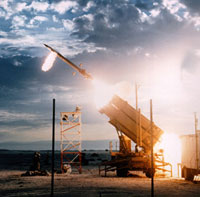Russia prepares to respond to USA's missile defense plans in Europe
Russia believes that the deployment of US missile defense system in Eastern Europe poses a potential threat to the national security of the Russian Federation. Russia will hold firm on its opposition to the USA at this point, the foreign minister said Monday.

“It should be well understood that we have our own “red lines” in spite of the fact that Russia prefers not to confront other countries in foreign politics. A “red line” implies a real threat to the national or international security,” Russia’s Foreign Minister Sergei Lavrov said.
“The plans of the US administration to deploy elements of its missile defense system in Eastern Europe and the regulation of the Kosovo problem are included on the list of such issues.
The minister added that Russia cannot but react to USA’s actions. “Russia is not haggling. This is what our international partners must understand,” said he.
Sergei Lavrov indicated that he could see no possible breakthrough in the near future to two of the biggest irritants in relations between Russia and the West.
Russia vehemently opposes the United States' push to place elements of a missile-defense system in Poland and the Czech Republic. Moscow claims the system is aimed at undermining Russia's missile strength, thereby destroying the balance of power in Europe. The U.S. says the system is aimed at blocking possible missile attacks by rogue states such as Iran.
On Kosovo, Russia opposes the Western-supported prospect of granting the Serbian province independence. Serbia says Kosovo, which has been under international administration since the end of fighting in 1999, must remain a part of the country. Russia has repeatedly stated it will not support any decision on Kosovo's status that is not agreed to by Serbia.
The foreign minister also criticized Britain for its position in the dispute over extraditing Andrei Lugovoi, the Russian identified by Britain as the main suspect in last year's murder by radioactive poison of dissident former security agent Alexander Litvinenko.
Russia says its constitution prohibits such extraditions, but that it is willing to put Lugovoi on trial at home if Britain presents sufficient evidence.
"It is a pity that in the absence of convincing evidence against Lugovoi, London has opted for a noisy propaganda show," Lavrov said. In July, Britain ordered the expulsion of four Russian diplomats in protest of the extradition refusal; Russia countered by expelling four Britons.
Russia has consistently complained about Britain's refusal to extradite Russian tycoon Boris Berezovsky and Chechen terrorist envoy Akhmed Zakayev, both of whom have been granted asylum there.
"I do not think that the British side, in taking the decision several years ago to grant political asylum to certain odious characters, knowingly sought to manipulate Russia's internal affairs. But London has gradually found itself, willingly or unwillingly, drawn in as a participant in intrigues directed at Russia," Lavrov said.
Also Monday, a top Defense Ministry official said Russia would consider talks with the United States on reducing tactical nuclear weapons only if Britain and France also take part, Russian news agencies reported.
No treaties cover the countries' arsenals of tactical nuclear arms, and calls for negotiations on the issue arise periodically.
"We are ready to go into such talks with the United States, but let's include other countries in the process, first of all Britain and France," said Col.-Gen. Vladimir Verhkovtsev, head of the Defense Ministry's 12th Main Directorate, which has responsibility for nuclear weapons, according to the RIA-Novosti news agency.
His comments appeared to echo the concern Russia has expressed regarding the U.S. missile-defense system regarding distorting the balance of forces in Europe.
Subscribe to Pravda.Ru Telegram channel, Facebook, RSS!





